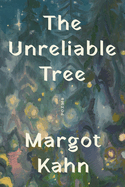
Margot Kahn's radiant first poetry collection, The Unreliable Tree, ponders how traumatic events interrupt everyday life. Poles of loss and abundance structure delicate poems infused with family history and food imagery.
The title phrase describes literal harvests but is also a metaphor for the vicissitudes of long relationships: "My husband and I marry every year/ eating apricots from the unreliable tree./ Some years it's only two or three,/ while others we have enough for jam." California's wildfires, Covid-19, a mass shooting, and health crises--an emergency surgery and a friend's cancer--serve as reminders of life's unpredictability. Disaster is random and inescapable. "I never imagined how inconsequential/ we would be, how at the mercy of the wind." Kahn's grandfather, a Holocaust survivor, lost many relatives; "Dinner" whimsically brings his dead back for an imaginary dinner party. She reconsiders rootedness and ownership, asking "who isn't living/ in diaspora?" Previous owners left their traces at her home; "in a country/ far away, police have assumed the house/ of my grandfather."
Kahn (Wanting) contrasts the fecundity of fruit trees and blackberries with evidence of decline. Earlier assertions are undermined: "My husband and I get divorced/ every winter, driving over the mountains." Fashion and food facilitate memory: Kahn's grandmother is associated with her lipstick shade, her mother with her dress sense, old flames with what they ate. Alliteration and internal rhymes sparkle as Kahn reveals "the solution to dissolution": find "places that will hold you" and leaven "darkness" with "grace." --Rebecca Foster, freelance reviewer, proofreader and blogger at Bookish Beck

